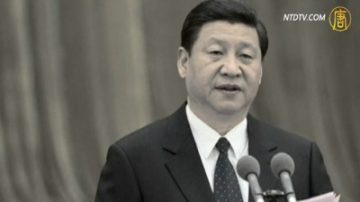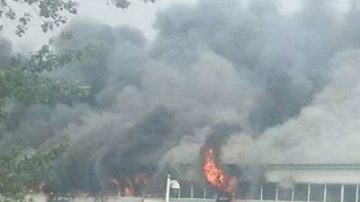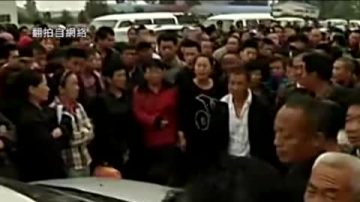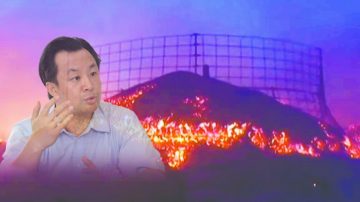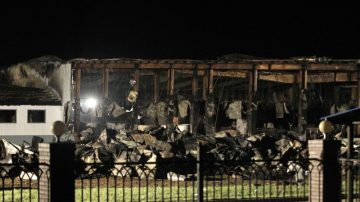【新唐人2013年06月11日訊】福建廈門發生公車大火爆炸案後,由於警方說法前後不一,加上24小時內迅速破案,卻不透露辦案細節、不公布調查證據和視頻,官方又禁止媒體記者深入採訪等,一系列作法,引發了大陸民眾對官方說辭的強烈質疑。網民不禁疑問:從「中儲糧」糧倉大火至公車爆炸,如此多的災難,究竟誰該負起責任?
發生在6月7號的廈門快速公交車大火慘案,造成了47名乘客死亡,8人失蹤。警方在案發後不到24小時公布破案,宣稱是一位名叫陳水總的60歲訪民,因生活不順和厭世而洩憤縱火,證據是他生前的遺書和微博,但當局拒絕對外公布遺書,加上案件本身疑點重重,一時間,網上誕生了無數「偵探版」的「分析貼」和「質問貼」,但隨後多被刪除。
此外,據《法國國際廣播電臺》6月9號報導,中宣部要求各大媒體「不派記者前往福建採訪廈門公車縱火案,已派出的立即撤離」。並且一律用《新華社》通稿和當地權威部門發佈的消息,尤其是案情要以公安機關權威結論為準,報導要所謂適度、適量,和不炒作犯罪嫌疑人和作案細節,以及,不渲染現場慘烈場面。
大陸專欄作家劉逸明:「宣傳部門為此事專門下禁令是非常不正常的,就說明在這個案件當中,有很多見不得光的東西,比如說,這位縱火者為甚麼縱火﹖可能跟這個社會制度,跟他的個人遭遇有很大的關係,他們可能非常擔心,媒體過度渲染了這個方面,會引起公眾對縱火犯的同情,會引起更多的人模仿這位縱火者。」
公車大火案中的倖存者向《新唐人》證實,現場確實有人縱火,但不確定是陳水總。
《新唐人》記者:「您有看到點火的人是多大年齡,甚麼樣子嗎?」
福建廈門公車大火倖存者:「50多歲吧,瘦瘦的。人好像挺沉默的,他腳底下拿了一個毛毯。」
記者:「您覺得真的是那個訪民做的嗎? 」
倖存者:「這我不清楚,反正我看到了,我看到他點火了,然後一下子火就很大,整個人、整身都是火。他點的是一個像毛毯類型的棉被。」
這位倖存者認為,這次大火死傷慘重與應急窗砸不開有很大關係,他說,車廂後半部的人基本沒能逃出來。
倖存者還透露,他在車廂著火前正好在用手機拍照,因此幸運的拍下了一段起火前後10多秒的視頻,並把視頻交給了媒體和警方,但警方和媒體卻沒有對外公布。
倖存者:「車廂著火的瞬間,我拍下了,我都已經給他們了,我都已經刪了,其餘的都被警察拿走了。」
有網民表示,即使公車大火是由於陳水總縱火引起的,但政府也難逃其責。有媒體爆料,陳水總為辦理社保,22次跑派出所沒有結果,反覆被推諉,對此,官方在通報中只字不提,僅強調他生活不順。
杭州仲裁委員會首席仲裁員吳有水律師:「其實折射出中國大陸一個社會矛盾的問題,百姓他個人的情況由於政府沒有很好的處理,那麼導致的這種矛盾結果損害了其他的無辜者,政府也應當要反思。其實我們現在的社會矛盾已經放到一個很尖銳的地步了。所以我們如果社會矛盾得不到解決的話,那麼以後這類事情會越來越多。」
廈門公交車爆炸時,中共國家主席習近平正在訪問美洲四國,有網民細心總結,在這期間,全中國居然發生了中儲糧糧倉、大連石化、吉林禽業、江西化工廠、濟南潤滑油廠等十多起大火。網民不禁疑問:究竟是誰製造了如此多的災難?
採訪編輯/張天宇 後製/李若琳
Questions Raised Over Who is Behind Nationwide Fire Disasters in China
An unexpected bus fire and bombing
occurred in Xiamen, Fuijian Province.
Local police authorities have given different accounts,
and have announced a swift clearing up of the case.
However, no details of the handling of the case was made
public, nor was evidence collected during the investigation.
The Chinese Communist Part (CCP) authorities have
openly banned media reporters from taking local interviews.
All theses actions have been
strongly questioned by the public.
Netizens are asking who were behind so many
disasters that have taken place in the past few days?
A bus fire occurred on June 7 in Xiamen city,
causing 47 deaths, with a further 8 people missing.
Within 24 hours, local police authorities claimed
that they have tracked down the criminals responsible.
The arsonist was Chen Shuizong, a local petitioner
aged 60, who started the fire to vent his resentment.
Police authorities alleged that the proof of guilt
was his farewell letter and micro-blog messages.
However, they refused to make this farewell letter public.
Meanwhile, many other doubts have
been cast over the official allegations.
Many posts have flooded the internet,
containing analyses and questioning.
Most were removed quickly by the CCP internet censors.
On June 9, Radio France Internationale reported
on the CCP Propaganda authorities’ orders
regarding news coverage of the incident.
Major media reporters are banned from
going to Xiamen to take interviews.
All reporters who have set off or who have
arrived there are required to return immediately.
All media in China are only allowed to use
Xinhua News Agency news scripts, and
information announced by local authorities.
The description of the incident should be
based on the police authorities’ conclusion.
The incident should be “moderately”
reported in content and in quantity.
No hypes shall be made on the criminal suspect,
his criminal details, and on the horrifying scene.
Liu Yiming, Columnist in China: “It’s very unusual that
the propaganda authorities issued such a specific ban.
This indicates that there’s a lot of darkness behind it.
For example, why did the arsonist start the fire?
This may have more to do with the social
order, and his personal experiences.
The authorities might fear that media exaggeration
will arouse public sympathy for the arsonist.
They may fear this could trigger more people to follow suit.”
A survivor of the bus fire confirmed to
NTD that there was an on-the-spot arsonist.
But they couldn’t be identified as Chen Shuizong.
NTD journalist: “Did you witness the arsonist?
How old was he and what he looked like?”
Anon survivor: “He was thin, in his 50s. He seemed very
silent, and carried a blanket that was put under his feet.”
NTD journalist: “Do you believe that
the arsonist was that petitioner?”
Anon survivor: “I don’t know. But anyhow,
I really saw him igniting the fire.
It diffused all over his body instantly.
He set a blanket-like quilt on fire.”
The survivor says that the high rate
of casualties was mainly caused by
failure to break the emergency window.
He revealed that nearly all passengers who stayed
in the latter part of the bus were engulfed by the fire.
The survivor says he took camera
phone pictures before the fire started.
So he filmed a 10-second video clip covering
the scenes, before and after the fire was ignited.
He sent it to the media and the police,
which was subsequently never announced.
Anon survivor: “I filmed the fleeting
moment when the carriage caught fire.
I’ve given it to the police, and it didn’t keep personally.”
Netizens commented that even if Chen Shuizong was the
arsonist, the government couldn’t absolve itself from blame.
Media reported that Chen Shuizong
visited a local police station 22 times.
He was trying to apply for social security.
But he was repeatedly refused.
None of these facts were mentioned
in the official announcements.
The authorities only claimed that Chen
had “experienced disappointment in his life”.
Wu Youshui, Chief arbitrator, Hangzhou city: “This
reflects social conflicts commonly existing in China.
An ordinary citizen was treated badly by
the authorities in getting social welfare.
This had caused a social conflict,
which later victimizes other innocents.
So the authorities should take this introspectively.
Today, social conflicts are actually very acute in China.
If these problems remain unchanged, there will be
further similar cases to be expected in the future.”
When the bus fire broke out, the CCP
leader Xi Jinping was visiting the U.S.
During Xi’s overseas trip, over
10 fires have occurred across China.
These included a Sinograin grain depot in Helongjiang,
a petrochemical plant in Dalian, a poultry farm in Jilin,
a chemical plant in Jiangxi, and a lubricants plant in Jinan.
Netizens question who was
really behind so many disasters?
發生在6月7號的廈門快速公交車大火慘案,造成了47名乘客死亡,8人失蹤。警方在案發後不到24小時公布破案,宣稱是一位名叫陳水總的60歲訪民,因生活不順和厭世而洩憤縱火,證據是他生前的遺書和微博,但當局拒絕對外公布遺書,加上案件本身疑點重重,一時間,網上誕生了無數「偵探版」的「分析貼」和「質問貼」,但隨後多被刪除。
此外,據《法國國際廣播電臺》6月9號報導,中宣部要求各大媒體「不派記者前往福建採訪廈門公車縱火案,已派出的立即撤離」。並且一律用《新華社》通稿和當地權威部門發佈的消息,尤其是案情要以公安機關權威結論為準,報導要所謂適度、適量,和不炒作犯罪嫌疑人和作案細節,以及,不渲染現場慘烈場面。
大陸專欄作家劉逸明:「宣傳部門為此事專門下禁令是非常不正常的,就說明在這個案件當中,有很多見不得光的東西,比如說,這位縱火者為甚麼縱火﹖可能跟這個社會制度,跟他的個人遭遇有很大的關係,他們可能非常擔心,媒體過度渲染了這個方面,會引起公眾對縱火犯的同情,會引起更多的人模仿這位縱火者。」
公車大火案中的倖存者向《新唐人》證實,現場確實有人縱火,但不確定是陳水總。
《新唐人》記者:「您有看到點火的人是多大年齡,甚麼樣子嗎?」
福建廈門公車大火倖存者:「50多歲吧,瘦瘦的。人好像挺沉默的,他腳底下拿了一個毛毯。」
記者:「您覺得真的是那個訪民做的嗎? 」
倖存者:「這我不清楚,反正我看到了,我看到他點火了,然後一下子火就很大,整個人、整身都是火。他點的是一個像毛毯類型的棉被。」
這位倖存者認為,這次大火死傷慘重與應急窗砸不開有很大關係,他說,車廂後半部的人基本沒能逃出來。
倖存者還透露,他在車廂著火前正好在用手機拍照,因此幸運的拍下了一段起火前後10多秒的視頻,並把視頻交給了媒體和警方,但警方和媒體卻沒有對外公布。
倖存者:「車廂著火的瞬間,我拍下了,我都已經給他們了,我都已經刪了,其餘的都被警察拿走了。」
有網民表示,即使公車大火是由於陳水總縱火引起的,但政府也難逃其責。有媒體爆料,陳水總為辦理社保,22次跑派出所沒有結果,反覆被推諉,對此,官方在通報中只字不提,僅強調他生活不順。
杭州仲裁委員會首席仲裁員吳有水律師:「其實折射出中國大陸一個社會矛盾的問題,百姓他個人的情況由於政府沒有很好的處理,那麼導致的這種矛盾結果損害了其他的無辜者,政府也應當要反思。其實我們現在的社會矛盾已經放到一個很尖銳的地步了。所以我們如果社會矛盾得不到解決的話,那麼以後這類事情會越來越多。」
廈門公交車爆炸時,中共國家主席習近平正在訪問美洲四國,有網民細心總結,在這期間,全中國居然發生了中儲糧糧倉、大連石化、吉林禽業、江西化工廠、濟南潤滑油廠等十多起大火。網民不禁疑問:究竟是誰製造了如此多的災難?
採訪編輯/張天宇 後製/李若琳
Questions Raised Over Who is Behind Nationwide Fire Disasters in China
An unexpected bus fire and bombing
occurred in Xiamen, Fuijian Province.
Local police authorities have given different accounts,
and have announced a swift clearing up of the case.
However, no details of the handling of the case was made
public, nor was evidence collected during the investigation.
The Chinese Communist Part (CCP) authorities have
openly banned media reporters from taking local interviews.
All theses actions have been
strongly questioned by the public.
Netizens are asking who were behind so many
disasters that have taken place in the past few days?
A bus fire occurred on June 7 in Xiamen city,
causing 47 deaths, with a further 8 people missing.
Within 24 hours, local police authorities claimed
that they have tracked down the criminals responsible.
The arsonist was Chen Shuizong, a local petitioner
aged 60, who started the fire to vent his resentment.
Police authorities alleged that the proof of guilt
was his farewell letter and micro-blog messages.
However, they refused to make this farewell letter public.
Meanwhile, many other doubts have
been cast over the official allegations.
Many posts have flooded the internet,
containing analyses and questioning.
Most were removed quickly by the CCP internet censors.
On June 9, Radio France Internationale reported
on the CCP Propaganda authorities’ orders
regarding news coverage of the incident.
Major media reporters are banned from
going to Xiamen to take interviews.
All reporters who have set off or who have
arrived there are required to return immediately.
All media in China are only allowed to use
Xinhua News Agency news scripts, and
information announced by local authorities.
The description of the incident should be
based on the police authorities’ conclusion.
The incident should be “moderately”
reported in content and in quantity.
No hypes shall be made on the criminal suspect,
his criminal details, and on the horrifying scene.
Liu Yiming, Columnist in China: “It’s very unusual that
the propaganda authorities issued such a specific ban.
This indicates that there’s a lot of darkness behind it.
For example, why did the arsonist start the fire?
This may have more to do with the social
order, and his personal experiences.
The authorities might fear that media exaggeration
will arouse public sympathy for the arsonist.
They may fear this could trigger more people to follow suit.”
A survivor of the bus fire confirmed to
NTD that there was an on-the-spot arsonist.
But they couldn’t be identified as Chen Shuizong.
NTD journalist: “Did you witness the arsonist?
How old was he and what he looked like?”
Anon survivor: “He was thin, in his 50s. He seemed very
silent, and carried a blanket that was put under his feet.”
NTD journalist: “Do you believe that
the arsonist was that petitioner?”
Anon survivor: “I don’t know. But anyhow,
I really saw him igniting the fire.
It diffused all over his body instantly.
He set a blanket-like quilt on fire.”
The survivor says that the high rate
of casualties was mainly caused by
failure to break the emergency window.
He revealed that nearly all passengers who stayed
in the latter part of the bus were engulfed by the fire.
The survivor says he took camera
phone pictures before the fire started.
So he filmed a 10-second video clip covering
the scenes, before and after the fire was ignited.
He sent it to the media and the police,
which was subsequently never announced.
Anon survivor: “I filmed the fleeting
moment when the carriage caught fire.
I’ve given it to the police, and it didn’t keep personally.”
Netizens commented that even if Chen Shuizong was the
arsonist, the government couldn’t absolve itself from blame.
Media reported that Chen Shuizong
visited a local police station 22 times.
He was trying to apply for social security.
But he was repeatedly refused.
None of these facts were mentioned
in the official announcements.
The authorities only claimed that Chen
had “experienced disappointment in his life”.
Wu Youshui, Chief arbitrator, Hangzhou city: “This
reflects social conflicts commonly existing in China.
An ordinary citizen was treated badly by
the authorities in getting social welfare.
This had caused a social conflict,
which later victimizes other innocents.
So the authorities should take this introspectively.
Today, social conflicts are actually very acute in China.
If these problems remain unchanged, there will be
further similar cases to be expected in the future.”
When the bus fire broke out, the CCP
leader Xi Jinping was visiting the U.S.
During Xi’s overseas trip, over
10 fires have occurred across China.
These included a Sinograin grain depot in Helongjiang,
a petrochemical plant in Dalian, a poultry farm in Jilin,
a chemical plant in Jiangxi, and a lubricants plant in Jinan.
Netizens question who was
really behind so many disasters?

